最新牛津小学英语5B Unit1知识点归纳
- 格式:doc
- 大小:35.00 KB
- 文档页数:3
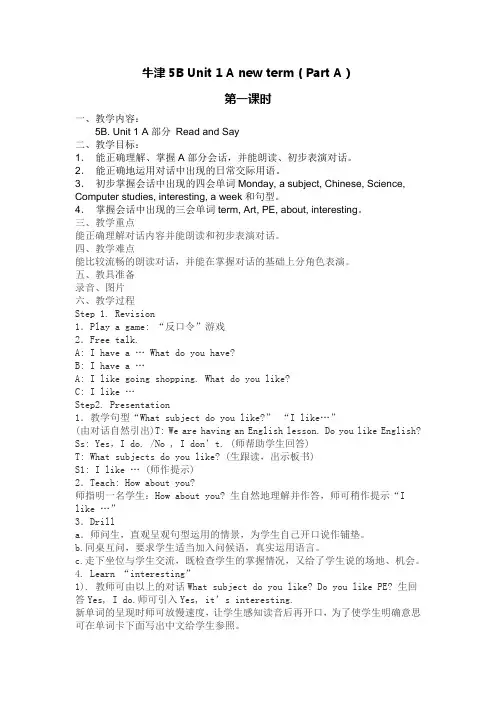
牛津5B Unit 1 A new term(Part A)第一课时一、教学内容:5B. Unit 1 A部分Read and Say二、教学目标:1.能正确理解、掌握A部分会话,并能朗读、初步表演对话。
2.能正确地运用对话中出现的日常交际用语。
3.初步掌握会话中出现的四会单词Monday, a subject, Chinese, Science, Computer studies, interesting, a week和句型。
4.掌握会话中出现的三会单词term, Art, PE, about, interesting。
三、教学重点能正确理解对话内容并能朗读和初步表演对话。
四、教学难点能比较流畅的朗读对话,并能在掌握对话的基础上分角色表演。
五、教具准备录音、图片六、教学过程Step 1. Revision1.Play a game: “反口令”游戏2.Free talk.A: I have a … What do you have?B: I have a …A: I like going shopping. What do you like?C: I like …Step2. Presentation1.教学句型“What subject do you like?”“I like…”(由对话自然引出)T: We are having an English lesson. Do you like English? Ss: Yes,I do. /No , I don’t. (师帮助学生回答)T: What subjects do you like? (生跟读,出示板书)S1: I like … (师作提示)2.Teach: How about you?师指明一名学生:How about you? 生自然地理解并作答,师可稍作提示“I like …”3.Drilla.师问生,直观呈观句型运用的情景,为学生自己开口说作铺垫。
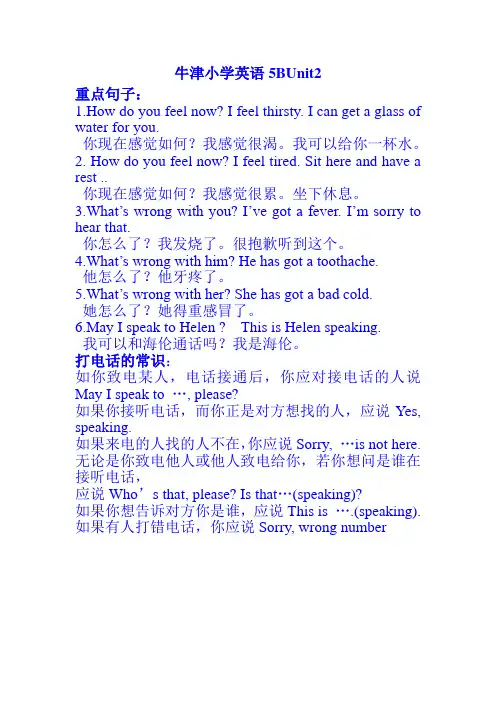
牛津小学英语5BUnit2重点句子:1.How do you feel now? I feel thirsty. I can get a glass of water for you.你现在感觉如何?我感觉很渴。
我可以给你一杯水。
2. How do you feel now? I feel tired. Sit here and have a rest ..你现在感觉如何?我感觉很累。
坐下休息。
3.What’s wrong with you? I’ve got a fever. I’m so rry to hear that.你怎么了?我发烧了。
很抱歉听到这个。
4.What’s wrong with him? He has got a toothache.他怎么了?他牙疼了。
5.What’s wrong with her? She has got a bad cold.她怎么了?她得重感冒了。
6.May I speak to Helen ? This is Helen speaking.我可以和海伦通话吗?我是海伦。
打电话的常识:如你致电某人,电话接通后,你应对接电话的人说May I speak to …, please?如果你接听电话,而你正是对方想找的人,应说Yes, speaking.如果来电的人找的人不在,你应说Sorry, …is not here. 无论是你致电他人或他人致电给你,若你想问是谁在接听电话,应说Who’s that, please? Is that…(speaking)?如果你想告诉对方你是谁,应说This is ….(speaking). 如果有人打错电话,你应说Sorry, wrong number。
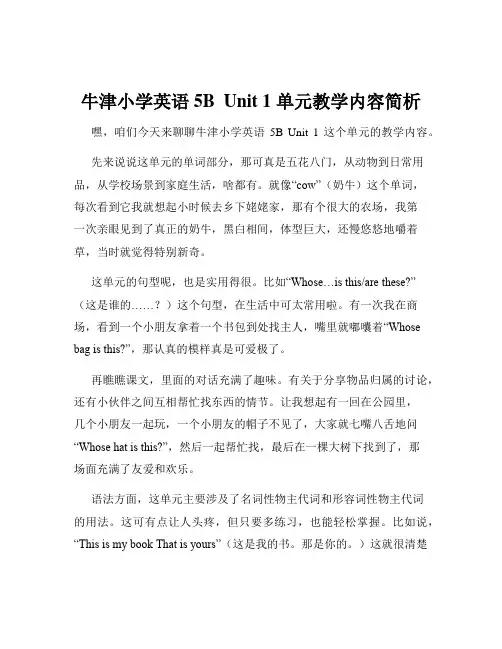
牛津小学英语5B Unit 1 单元教学内容简析嘿,咱们今天来聊聊牛津小学英语5B Unit 1 这个单元的教学内容。
先来说说这单元的单词部分,那可真是五花八门,从动物到日常用品,从学校场景到家庭生活,啥都有。
就像“cow”(奶牛)这个单词,每次看到它我就想起小时候去乡下姥姥家,那有个很大的农场,我第一次亲眼见到了真正的奶牛,黑白相间,体型巨大,还慢悠悠地嚼着草,当时就觉得特别新奇。
这单元的句型呢,也是实用得很。
比如“Whose…is this/are these?”(这是谁的……?)这个句型,在生活中可太常用啦。
有一次我在商场,看到一个小朋友拿着一个书包到处找主人,嘴里就嘟囔着“Whose bag is this?”,那认真的模样真是可爱极了。
再瞧瞧课文,里面的对话充满了趣味。
有关于分享物品归属的讨论,还有小伙伴之间互相帮忙找东西的情节。
让我想起有一回在公园里,几个小朋友一起玩,一个小朋友的帽子不见了,大家就七嘴八舌地问“Whose hat is this?”,然后一起帮忙找,最后在一棵大树下找到了,那场面充满了友爱和欢乐。
语法方面,这单元主要涉及了名词性物主代词和形容词性物主代词的用法。
这可有点让人头疼,但只要多练习,也能轻松掌握。
比如说,“This is my book That is yours”(这是我的书。
那是你的。
)这就很清楚地展示了两者的区别。
我记得有一次辅导我小侄子做作业,他总是分不清,急得抓耳挠腮,我就耐心地给他举例,终于让他明白了。
还有那些练习题,也是精心设计的。
通过各种形式,让孩子们巩固所学知识。
像连线题、填空题,都能帮助孩子们加深对单词和句型的记忆。
总的来说,牛津小学英语5B Unit 1 这个单元的教学内容丰富多彩,实用性强。
只要孩子们认真学,一定能在英语学习的道路上更进一步!就像当初我在学习英语的过程中,一点点积累,才有了现在的成果。
希望孩子们也能在这个单元的学习中收获满满,爱上英语这门有趣的语言!。
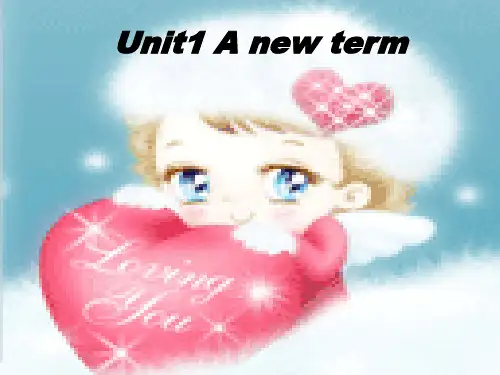
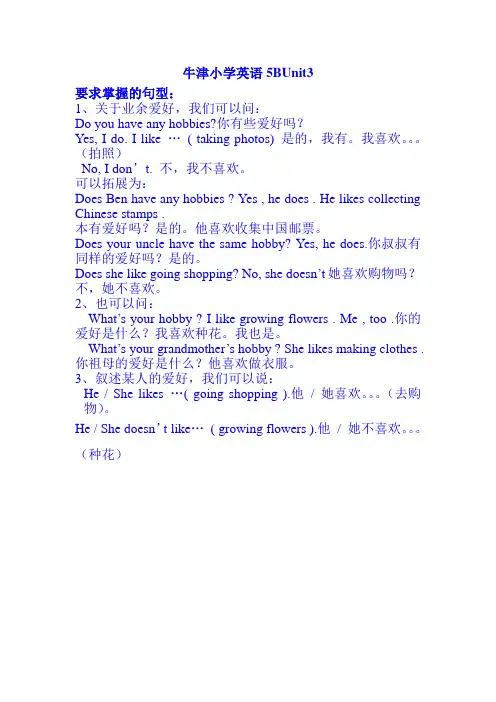
牛津小学英语5BUnit3
要求掌握的句型:
1、关于业余爱好,我们可以问:
Do you have any hobbies?你有些爱好吗?
Yes, I do. I like …( taking photos) 是的,我有。
我喜欢。
(拍照)
No, I don’t. 不,我不喜欢。
可以拓展为:
Does Ben have any hobbies ? Yes , he does . He likes collecting Chinese stamps .
本有爱好吗?是的。
他喜欢收集中国邮票。
Does your uncle have the same hobby? Yes, he does.你叔叔有同样的爱好吗?是的。
Does she like going shopping? No, she doesn’t她喜欢购物吗?不,她不喜欢。
2、也可以问:
What’s your hobby ? I like growing flowers . Me , too .你的爱好是什么?我喜欢种花。
我也是。
What’s your grandmother’s hobby ? She likes making clothes .你祖母的爱好是什么?他喜欢做衣服。
3、叙述某人的爱好,我们可以说:
He / She likes …( going shopping ).他/ 她喜欢。
(去购物)。
He / She doesn’t like…( growing flowers ).他/ 她不喜欢。
(种花)。
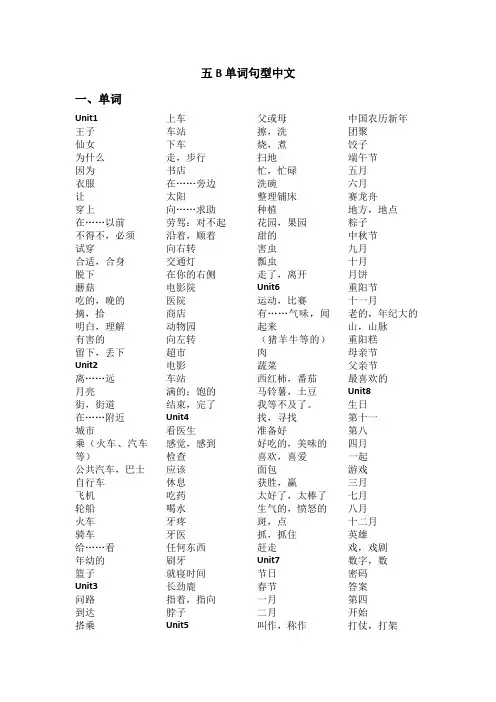
五B单词句型中文一、单词Unit1王子仙女为什么因为衣服让穿上在……以前不得不,必须试穿合适,合身脱下蘑菇吃的,晚的摘,拾明白,理解有害的留下,丢下Unit2离……远月亮街,街道在……附近城市乘(火车、汽车等)公共汽车,巴士自行车飞机轮船火车骑车给……看年幼的篮子Unit3问路到达搭乘上车车站下车走,步行书店在……旁边太阳向……求助劳驾:对不起沿着,顺着向右转交通灯在你的右侧电影院医院商店动物园向左转超市电影车站满的;饱的结束,完了Unit4看医生感觉,感到检查应该休息吃药喝水牙疼牙医任何东西刷牙就寝时间长劲鹿指着,指向脖子Unit5父或母擦,洗烧,煮扫地忙,忙碌洗碗整理铺床种植花园,果园甜的害虫瓢虫走了,离开Unit6运动,比赛有……气味,闻起来(猪羊牛等的)肉蔬菜西红柿,番茄马铃薯,土豆我等不及了。
找,寻找准备好好吃的,美味的喜欢,喜爱面包获胜,赢太好了,太棒了生气的,愤怒的斑,点抓,抓住赶走Unit7节日春节一月二月叫作,称作中国农历新年团聚饺子端午节五月六月赛龙舟地方,地点粽子中秋节九月十月月饼重阳节十一月老的,年纪大的山,山脉重阳糕母亲节父亲节最喜欢的Unit8生日第十一第八四月一起游戏三月七月八月十二月英雄戏,戏剧数字,数密码答案第四开始打仗,打架二、词组Unit 1 坐在篮子里很高兴做某事在王子家住在北京听清来帮帮我拜访她来到医院那么伤心住在城市图书馆附近指着……去聚会步行去那儿喜欢吃糖让某人做某事骑车到那觉得累穿上新衣新鞋在一艘大轮船上工作在图书馆回来许多城市Unit 5玩得高兴Unit 3 帮助我们的父母必须,不得不问路周六上午试穿那只鞋到你家擦洗汽车试穿它乘地铁帮助他谁的鞋子上地铁在厨房做早饭喜欢看故事下(车)在客厅在森林里走到……扫地找到一些蘑菇在……旁边在他的卧室在树下从……出来我的表弟快点向……寻求帮助做晚饭摘了一个大红蘑菇打扰了洗碗看起来那么好看沿着这条街走擦桌子对……有害往右拐在客厅吃水果脱掉她的外套在你的右侧整理床铺觉得热看部新电影洗衣服穿上他的夹克乘公交车去种葡萄所有的女孩等公交车在他的花园丢下一只鞋在公交车站又大又甜很合适乘出租车去电影院一些害虫Unit 2 太多汽车走了,离开你的新家在街上Unit 6非常喜欢它坐地铁到电影院闻着很美味离……远Unit 4 烧肉住在月亮街看医生洗些蔬菜乘公交车来学校觉得冷烧番茄汤住在学校附近发烧了做土豆烧肉步行来学校在家休息找些果汁住在阳光镇吃些药在冰箱里乘地铁来学校喝些热水一些橙汁一名出租车司机去看牙医许多害虫和瓢虫喜欢在公园里骑车吃许多/太多糖来帮助……想要做某事刷牙赶走给Sam看他的自行车睡觉前Unit 7骑自行车去上学在医院里春节太小了(年龄小)来看他在一月或二月中国新年(农历新年)从……出来在这个节日里和家人们团聚吃饺子端午节在五月或六月龙舟赛在一些地方吃粽子中秋节在九月或十月吃月饼看月亮重阳节在十月或十一月老年人爬山吃重阳糕母亲节在五月的第二个星期天喜欢所有的节日在母亲节给妈妈送礼物一个好主意父亲节我最喜爱的节日Unit 8在5月11日吃一顿丰盛的晚餐吃些面条在那之后和猫玩玩得很高兴在4月8日在家开派对去买生日蛋糕一起吃生日蛋糕玩一些游戏开门擅长数学第一个数进去开始战斗跑开三、句型Unit 1在王子的房子里有一个聚会,但是灰姑娘不能去。
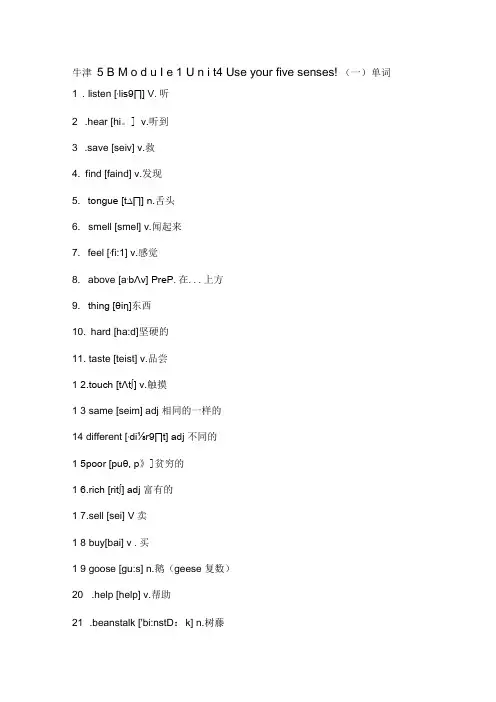
牛津5 B M o d u I e 1 U n i t4 Use your five senses! (一)单词1 . listen [,lis9∏] V.听2 .hear [hi。
] v.听到3 .save [seiv] v.救4. find [faind] v.发现5. tongue [t∆∏] n.舌头6. smell [smel] v.闻起来7. feel [,fi:1] v.感觉8. above [a,bΛv] PreP.在...上方9. thing [θiη]东西10. hard [ha:d]坚硬的11. taste [teist] v.品尝1 2.touch [tΛt∫] v.触摸1 3 same [seim] adj 相同的一样的14 different [,di⅛r9∏t] adj 不同的1 5poor [puθ, p》]贫穷的1 6.rich [rit∫] adj 富有的1 7.sell [sei] V 卖1 8 buy[bai] v .买1 9 goose [gu:s] n.鹅(geese 复数)20 .help [help] v.帮助21 .beanstalk ['bi:nstD:k] n.树藤22 .castle['ka:sl] n.城堡23 .giant ['d3ai3nt] n.巨人24 .golden ['gauldan] adj.金色的25 .slide [slaid] n.滑梯26 .corn [k3:n] n.(美)玉米;(英)谷物27 . adventure [ad'vent∫θ] n.冒险历(二)重点短语1) listen and hear 听2) with my ears用我的手3) smell with my nose 用鼻子闻4)look and see with my eyes 用眼睛看5) touch and feel with my hands 用手触摸和感觉6) taste with my tongue 用舌头品赏7) SupergirPs adventure超级女孩的冒险8) be lost 丢失9) three boys in a country park在国家公园的三个男孩10) fly above the country park 在国家公园上空飞11) find a small fire 找到一个小火堆12) hear a noise 听到噪声13) come on 力口油14) help sb (to) do sth帮助某人做某事15)shout at sb朝某人大喊大叫16) on an island 在小岛上17) save one's Iife挽救某人生命save us a lot of time 节约时间save water 节水18) taste these drinks 品尝这些饮料19) the same or different 一样的或是不一样的32) giant20) some golden eggs 一些金蛋21) be poor at 不擅长22) sell sth to sb = sell sb sth 卖给某人某物23) buy sb sth = buy sth to sb 给某人买某物24) climb up 爬上climb down 爬下25) a golden goose 一个金鹅26) lay golden eggs 生金蛋27)the rich 富人the poor 穷人28) go home 回家29) under his arm 夹着...30) chase =run after 追赶31) have a picnic 吃野餐66) super32) look nice看起来好看33) be different from 和 .. 不一样34) be the same as 和... 一样(≡)知识点解析1学习听、闻、看、触、尝五个感官动词。
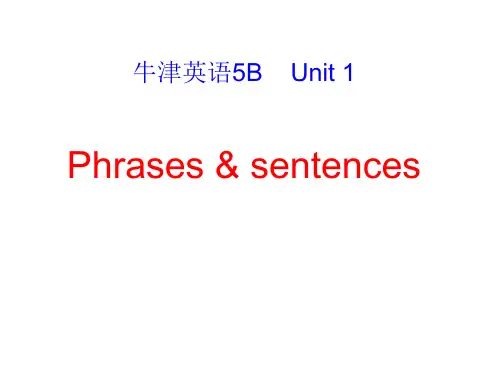
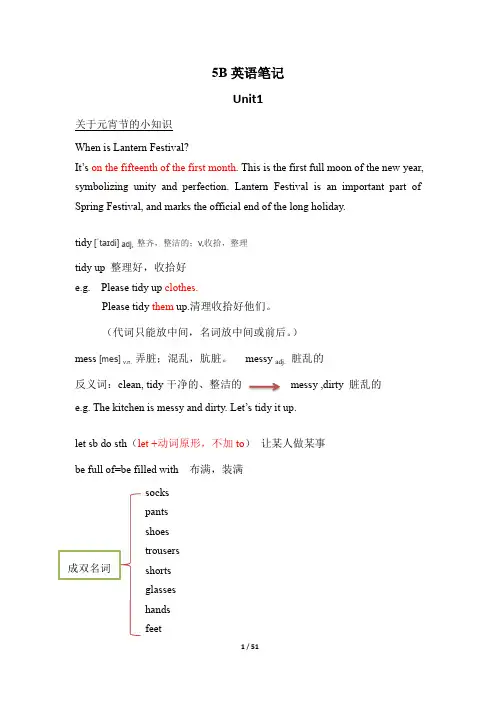
5B英语笔记Unit1关于元宵节的小知识When is Lantern Festival?It’s on the fifteenth of the first month. This is the first full moon of the new year, symbolizing unity and perfection. Lantern Festival is an important part of Spring Festival, and marks the official end of the long holiday.tidy[ˈtaɪdi] adj,整齐,整洁的;v,收拾,整理tidy up 整理好,收拾好e.g. Please tidy up clothes.Please tidy them up.清理收拾好他们。
(代词只能放中间,名词放中间或前后。
)mess [mes] v.n. 弄脏;混乱,肮脏。
messy adj.脏乱的反义词:clean, tidy干净的、整洁的messy ,dirty 脏乱的e.g. The kitchen is messy and dirty. Let’s tidy it up.let sb do sth(let +动词原形,不加to)让某人做某事be full of=be filled with 布满,装满sockspantsshoestrousersshortsglasseshandsfeet成双名词socks [sɑks]袜子yours [jɔ:z] cap [kæp]mine [maɪn] crayon [ˈkreɪən]umbrella [ʌmˈbrelə] nail [neɪl] 钉子,指甲drop [drɒp] v.n.stick [stɪk]n.树枝,木棍,v.粘住,粘贴,坚持stick to1. 秒 e.g. two seconds两秒,a few seconds/ minutes/hours一会2. 第二a few 几个few 几乎没有a little 几个little 几乎没有some/ any一些a lot of =lots of许多e.g. There are many/ some/ a lot of apple s in the fridge(冰箱).There is little bread.We need to buy.We have a few oranges to eat.问:Whose ……is this(近)/ that(远)?答:It’s/ It is …….问:Whose ……are these/ those?答:They’re/ They are…….put on 穿上put …on 把…放上面+可数名词的复数+不可数名词+可数复数名词/不可数名词secondput …in/ under 把……放里面/下面put…away 把……收起来eg. It’s cold. Put on your coat.Please put the socks on your bed.Please put the books in your bag.sththank sb fordoing sth因某事感谢某人e.g. Thank you for helping me.belong to +宾格,“属于”teach sb(宾格)sth,“教某人某物”eg. I teach them English. (I teach their English. ()give sb sth= give sth to sb 给某人某物e.g. give him a block stone= give a black stone to himar [ɑ:] c ar d f ar m st ar t p ar k p ar ty m ar t[ɔ:] w ar w ar m aw ar due [u:] bl ue gl ue cl ue tr ue s ueoo [u:]sch oo l f oo d m oo n n oo n r oo m s oo n c oo l t oo z oo r oo ster ball oo n[ʊ] w oo d g oo d l oo k b oo k f oo t c oo k第一单元重点句子:1. Are they yours?Yes, they are. / No, they aren't.2. Whose socks are these?3. They are mine.4. Is this yours too, peter? No. It's Paul's.5. What a mess!6. Can you put them on his bed?7. All the nails fall on the floor.8. The nails all stick to it.Unit 2Where are they?易错提示:误写成them评讲:在这句里they是主语,而这句是疑问句,就不遵循“宾语放句后”的规则了。
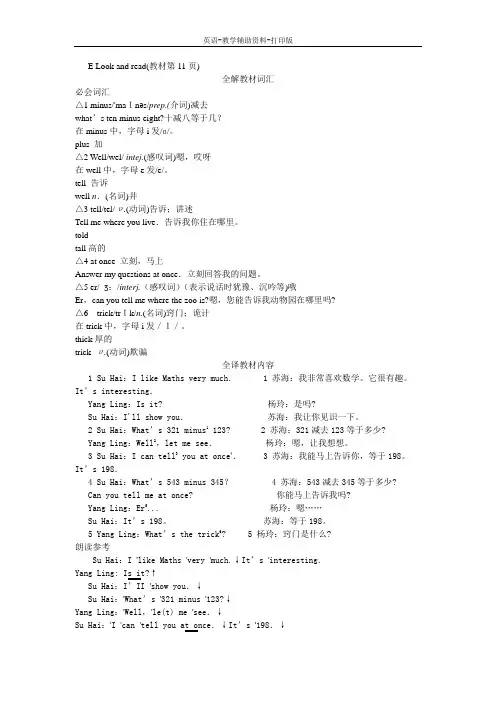
E Look and read(教材第11页)全解教材词汇必会词汇△1 minus/'maInəs/prep.(介词)减去what’s ten minus eight?十减八等于几?在minus中,字母i发/ɑ/。
plus 加△2 Well/wel/ intej.(感叹词)嗯,哎呀在well中,字母e发/e/。
tell 告诉well n.(名词)井△3 tell/tel/υ.(动词)告诉;讲述Tell me where you live.告诉我你住在哪里。
toldtall高的△4 at once 立刻,马上Answer my questions at once.立刻回答我的问题。
△5 er/ʒ:/interj.(感叹词)(表示说话时犹豫、沉吟等)哦Er,can you tell me where the zoo is?嗯,您能告诉我动物园在哪里吗?△6 trick/trIk/n.(名词)窍门;诡计在trick中,字母i发/I/。
thick厚的trickυ.(动词)欺骗全译教材内容1 Su Hai:I like Maths very much. 1 苏海:我非常喜欢数学。
它很有趣。
It’s interesting.Yang Ling:Is it? 杨玲:是吗?Su Hai:I'll show you.苏海:我让你见识一下。
2 Su Hai:What’s 321 minus1 123? 2 苏海:321减去123等于多少?Yang Ling:Well2,let me see.杨玲:嗯,让我想想。
3 Su Hai:I can tell3 you at once4. 3 苏海:我能马上告诉你,等于198。
It’s 198.4 Su Hai:What’s 543 minus 345? 4 苏海:543减去345等于多少?Can you tell me at once? 你能马上告诉我吗?Yang Ling:Er5... 杨玲:嗯……Su Hai:It’s 198。
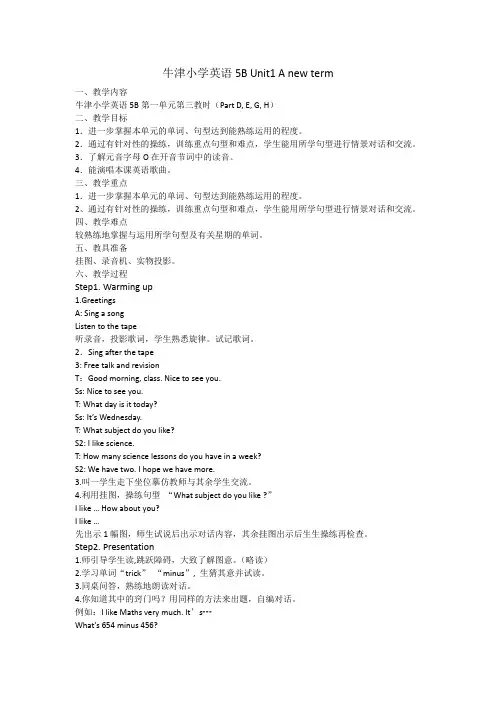
牛津小学英语5B Unit1 A new term一、教学内容牛津小学英语5B第一单元第三教时(Part D, E, G, H)二、教学目标1.进一步掌握本单元的单词、句型达到能熟练运用的程度。
2.通过有针对性的操练,训练重点句型和难点,学生能用所学句型进行情景对话和交流。
3.了解元音字母O在开音节词中的读音。
4.能演唱本课英语歌曲。
三、教学重点1.进一步掌握本单元的单词、句型达到能熟练运用的程度。
2、通过有针对性的操练,训练重点句型和难点,学生能用所学句型进行情景对话和交流。
四、教学难点较熟练地掌握与运用所学句型及有关星期的单词。
五、教具准备挂图、录音机、实物投影。
六、教学过程Step1. Warming up1.GreetingsA: Sing a songListen to the tape听录音,投影歌词,学生熟悉旋律。
试记歌词。
2.Sing after the tape3: Free talk and revisionT:Good morning, class. Nice to see you.Ss: Nice to see you.T: What day is it today?Ss: It’s Wednesday.T: What subject do you like?S2: I like science.T: How many science lessons do you have in a week?S2: We have two. I hope we have more.3.叫一学生走下坐位摹仿教师与其余学生交流。
4.利用挂图,操练句型“What subject do you like ?”I like … How abo ut you?I like …先出示1幅图,师生试说后出示对话内容,其余挂图出示后生生操练再检查。
Step2. Presentation1.师引导学生读,跳跃障碍,大致了解图意。
5B U1词组汇总
词组
1.have a lesson 上一节课
2.the first lesson 第一节课
3.the new term 新学期
4. this term 这学期
5.welcome back to school 欢迎回到学校
6.welcome to our school欢迎到我们学校来
7.eight s ubjects八门学科
8.what subject 什么学科
9.how about …怎么样
10.an interesting lesson 一节有趣的课
11.how many English lessons 多少节英语课
12. this week 这周
13. two weeks 两星期
14..in a week 在一周内
15. on Friday 在星期五
16. on Tuesday morning 在星期二上午
17. this morning/afternoon/evening
今天上午/下午/晚上
18. in the morning/afternoon/evening
在上午/下午/晚上
19. at seven twenty 在七点二十
20.let me see 让我想想/让我看看
21.tell me/him/her/them/us 告诉我/他/她/他们/我们
22. tell you at once 立刻告诉你
23.What’s the trick? 窍门是什么?
24.I’ll show you. 我将演示给你看.
25.boy s and girl s孩子们
26.like very much 非常喜欢
27 the hot coffee 热咖啡
28. near the clock 在钟附近
29. for the doctor 给医生的
30. for you/him/her 给你的/他的/她的
31. three Maths lessons三节数学课
32.every day每天
33.my timetable我的课程表
34.Sunday evening星期天晚上35.have an Art lesson上一堂美术课
36.from Sunday to Saturday从星期日到星期六
37.wish you happy every day祝你每天都开心
句型
1.W hat day is it today? 今天星期几?
It’s Monday. 今天星期一.
W hat lessons do you have in the morning? 你们上午有什么课?
We have C hinese, M aths, E nglish and S ocial S cience.我们有语文,数学,英语和社会科学。
2.What subject do you like?你喜欢什么科目?
I like C omputer Studies.我喜欢计算机课程. How about you? 你呢?I like PE.我喜欢体育. 3.What subject does he/she like?她/他喜欢什么学科?
He/She likes M usic ..她/他喜欢音乐。
4.How many days are there in a week?一周有多少天?
There are seven.有七天
5. Sunday is the first day of a week.星期日是一周的第一天。
6.How many English lessons do you have a week?你们一周有多少节英语课?
We have five English lessons a week.一周我们有五节英语课。
7.I like M aths very much,but I don`t like
C hinese.我非常喜欢数学,但是我不喜欢语文。
8.Miss Li and her student s are having an
English lesson.李老师和她的学生们正在上一堂英语课。
9.Y ang L ing likes English very much.杨玲非常喜欢英语。
S he doesn`t like Science.她不喜欢科学。
10.There is a PE lesson on Monday.星期一有一节体育课。
练习:
一、根据单词首字母和句子意思,将对话中的单词补充完整
A: Welcome b________ to school, Ben.
B: Nice to m________ you, Mr Green.
A: There is a n________ subject in this t_______, do you know?
B: Yes. It’s S________ S________.
A: Do you l________ it?
B: Maybe. I t________ it will be i________.
A: Of course. When do you h________ this l________? On M________?
B: No. It’s on F________. W________ will teach us, Mr Green?
A: Mr Zhang. He is a very good t________.
二、Fill in the blanks with proper prepositions 填入适当的介词[如;on,for,of等]
1. How many Art lessons do you have ________ a week?
2. We have a Computer Studies lesson ________ Friday.
3. First draw some flowers ________ the paper.
4. She goes to school ________ half past seven.
5. Can you come and help me ________ my Maths?
6. Here’s a new copybook ________ Nancy.
7. Take ________ your coat, please. It’s hot today.
8. Boys and girls, this is the first day ________ the new term.
三判断下列单词划线部分的读音是否相同,用√或x表示。
1. clock mother
( )
2. box Monday ( )
3. subject Tuesday ( )
4.
Friday like ( ) 5.
to hot ( )
6. Tuesday Thursday ( )
7.
have about ( )
8.
come some ( )
morning today ( ) 9.。